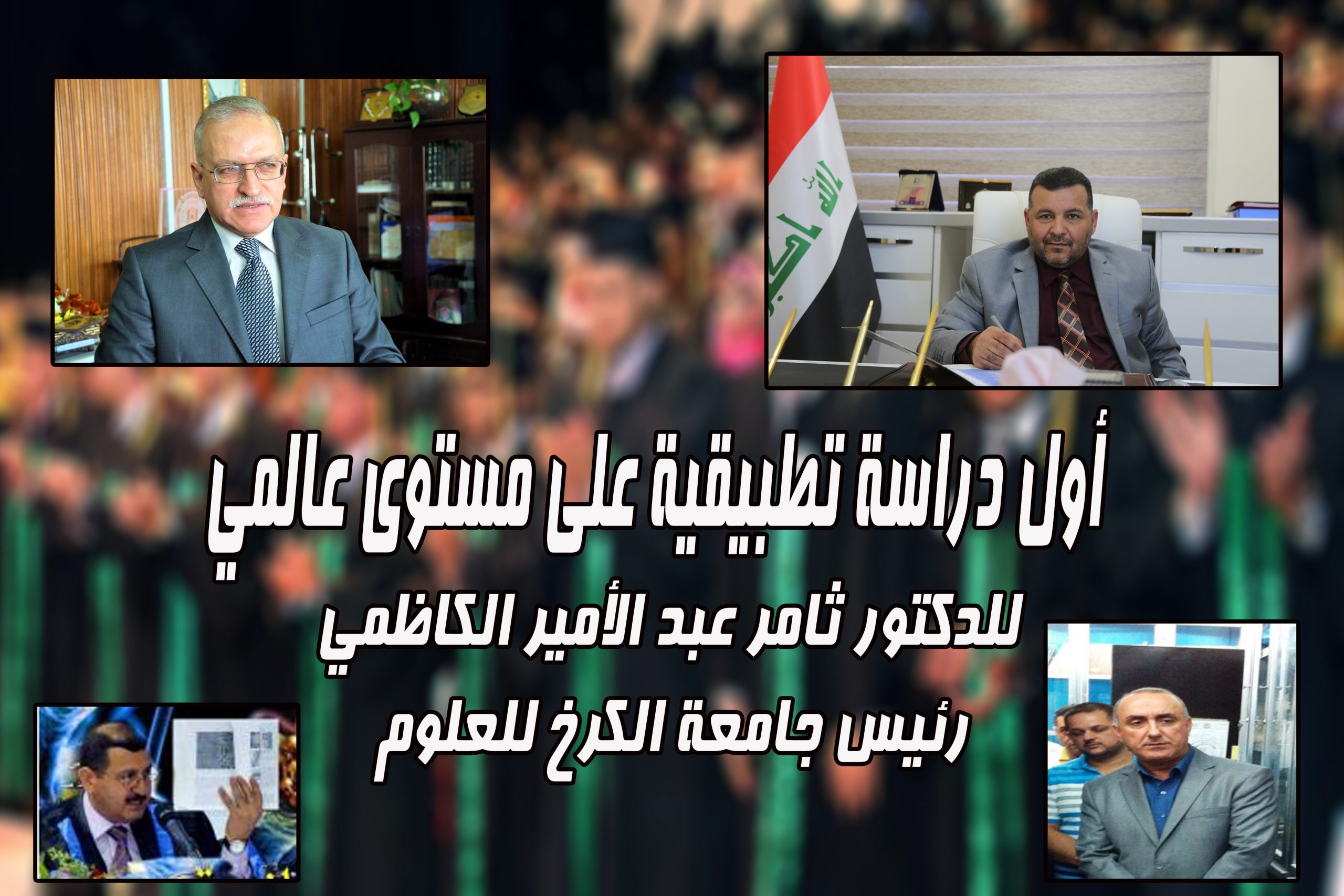
The first applied study on international levels by Assist. Prof. Dr. Thamir A. Al-Kazimi, Chancellor of Al-Karkh University of Science in Seminar attended by group of Scientists and Specialists in field of Physics, Chemistry and Nano-Science industry
The first applied study on international levels by Assist. Prof. Dr. Thamir A. Al-Kazimi, Chancellor of Al-Karkh University of Science in Seminar attended by group of Scientists and Specialists in field of Physics, Chemistry and Nano-Science industry
Nanotechnology is manipulation of matter on an atomic, molecular, and Supemolecular scale. The earliest, widespread description of nanotechnology referred to the particular technological goal of precisely manipulating atoms and molecules for fabrication of macro scale products, also now referred to as molecular nanotechnology. A more generalized description of nanotechnology was subsequently established by the National Nanotechnology Initiative, which defines nanotechnology as the manipulation of matter with at least one dimension sized from 1 to 100 nanometers. This definition reflects the fact that quantum mechanical effects are important at this quantum-realm scale, and so the definition shifted from a particular technological goal to a research category inclusive of all types of research and technologies that deal with the special properties of matter that occur below the given size threshold. It is therefore common to see the plural form “nanotechnologies” as well as “nano scale technologies” to refer to the broad range of research and applications whose common trait is size.
Nanotechnology as defined by size is naturally very broad, including fields of science as diverse as surface science, organic chemistry, molecular biology, semiconductor physics, micro fabrication, etc. The associated research and applications are equally diverse, ranging from extensions of conventional device physics to completely new approaches based upon molecular self-assembly, from developing new materials with dimensions on the nano scale to direct control of matter on the atomic scale. Scientists currently debate the future implications of nanotechnology. Nanotechnology may be able to create many new materials and devices with a vast range of applications, such as in nano medicine, nano electronics, biomaterials energy production, and consumer products.
University of Baghdad praises the accomplishment
University of Baghdad emphasized on developing scientific researches in order to live up to advanced levels in the world. Usually the University comes up with studies that are rare, to find their counterpart in the Arab world and the Middle East, and then gain a prominent place among other Universities in the world, that’s why; scientific positions at the University take the initiative to adopt projects and unconventional research studies, to provide Iraqi society and Arab world with knowledge and theoretical and practical science through the publications of these scientific researches in international journals that used by international institutions such as NASA and well-known Universities. On the other hand, Chancellor of University of Baghdad, Dr. Alaa Abdul Hussein, assured that the University should adopt topics that are related to community and that these topics must not be restricted to the theoretical side but they have to be in accordance with the approach which serves the market, to be valuable, realistic and go along with the requirements of time and its challenges.
Advanced Scientific Experiments
In a distinctive study entitled “industry of Nano-materials and chemical sensors” that discussed the most advanced and controversy science in the world, Dr. Thamir A. Al-Kazimi was able to conducting scientific experiments of manufacturing samples of nano scales with chemical sensors, so that, he achieved the first nano industry in the Middle East and Arab World. During the seminar, he managed through his research to review nano particles in applied experiments according to an applied scientific approach. The seminar was attended by Prof. Dr. Harith I. Jaafar, Prof. Dr. Raad M. Saleh, Prof. Dr. Bahaa H. Saleh, Assist. Prof. Dr. Talib S. Hammadi, and others.
Then, there was a documentary film about applied scientific experiments where the researcher showed how successful his experiments were, and the results he reached at. Furthermore, the seminar was documented by media and satellite channels, in the presence of a group of scientists and specialists in field of Physics and Chemistry. At the end of the session, Ministry of Industry offered to adopt this patent, as well as, department of Physics at college of Science/ University of Baghdad offered Dr. Al-Kazimi to buy the patent.
Dr. Al-Kazimi stated that his study included many of experiments, documentations and follow-up of the scientific phenomena, and then codified them according to modern mechanism that fits with the scientific developments in the world, especially that parts of his study had been published in well-known international journals like global innovations journal which issued in India. Moreover, his study depended on the scientific experiments at international Universities especially after correspondence and continued follow-up with them, as well as, visiting international scientific laboratories in Germany, Russia and other European countries in order to reach to results of high accuracy, that’s because studying in field of Physics needs Mathematical equations which does not accept any mistake.
He added as well that his studies will not stop at this point and there are more of updates and developments that could come with more complicated results, and that Nanotechnology is very wide field and carries many of experimental fields, therefore, there is an effort from University of Baghdad to adopt such experiments in this field and apply them at laboratories of college of Science, Alkhwarizmi college of Engineering and Ibn Al-Haitham Education college. And there is an attempt to merge these studies in a way that will meet the market’s needs, and to achieve applicable side that will serve the society and will contribute in the development of Iraqi industries.
